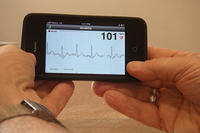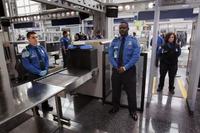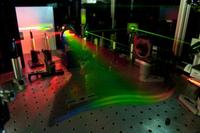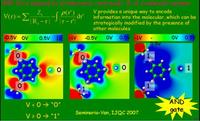-
Air transportation data helps identify, predict pandemics
Computational model demonstrates how disease spreads in a highly connected world. The computational work has led to a new mathematical theory for understanding the global spread of epidemics. The resulting insights could not only help identify an outbreak’s origin but could also significantly improve the ability to forecast the global pathways through which a disease might spread.
-
-
Airport scanner vendor failed to disclose use of Chinese components
Recently TSA cancelled a $60 million contract with Rapiscan Systems, a manufacturer of anatomically revealing airport security scanners, after Rapiscan was found to be using unapproved Chinese components in its scanners – and failing to disclose this fact to TSA. Rapiscan, in bidding on the contract, submitted a list of U.S.-made components used in the scanners to the agency, as required by law. After the company received an approval of that list – and the $60 million contract – it ordered the same components from a Chinese company — the Shanghai Advanced Non-Destructive Testing – instructing the Chinese company to label the Chinese-made components with the same part numbers as the originally approved, U.S.-made components, apparently in an effort to make it more difficult for TSA inspectors to notice the illegal switch. Members of the House Homeland Security Committee, charging that the use of Chinese components made the machines susceptible to sabotage, disruption, or spying, want to know whether TSA was aware of Rapiscan’s shenanigans.
-
-
Airport screeners miss unusual – and possibly dangerous -- items

A smartphone app that turns gamers into airport baggage screeners is showing that finding weapons and other illegal items is not all that easy, even when you are looking for them. Researchers analyzed data from searches of twenty million virtual suitcases in the game Airport Scanner created by Kedlin Co. and found that users failed in most cases to identify objects that occurred only rarely. The reason: Commonly found objects may be crowding out identification of the unusual items.
-
-
First no-fly list case goes to trial
Rahinah Ibrahim, dean of the architecture and engineering school at the University of Malaysia, took to trial on Monday her claim against the U.S. government for wrongfully listing her on the government’s no-fly list. Ibrahim has sought to clear her name since January 2005, when she was arrested at San Francisco International Airport. Similar lawsuits are pending across the country, but Ibrahim’s case is the first to go to trial. Ibrahim claims she was mistakenly placed on the no-fly list due to her national origin and Muslim faith.
-
-
Existing airports through futuristic glass pods
Two small Northeast airports, Syracuse and Atlantic City, have installed futuristic unmanned portals to replace security officers at the airports’ exit points. The move, which will add a few seconds to the end of passengers’ trips as they exit the airports, is estimated to save airports millions of dollars in wages over time.
-
-
Bottle scanning tech to enhance airport security, benefit passengers
Los Alamos scientists have advanced a Magnetic Resonance Imaging (MRI) technology that may provide a breakthrough for screening liquids at airport security. They have added low-power X-ray data to the mix, and as a result have unlocked a new detection technology. Funded in part by the DHS’s Science and Technology Directorate (S&T), the new system is named MagRay.
-
-
GAO says TSA’s costly behavioral detection program falls short
The Government Accountability Office(GAO) said last week that DHS may have wasted $1 billion on the Transportation Security Administration’s (TSA) Screening of Passengers by Observation Techniques (SPOT) program. SPOT aims to spot terrorists by detecting “anomalous” or suspicious behavior. The anomalous behavior – perspiration, fidgeting, restlessness – is supposed to be the result of high levels of stress, fear, or deception. Individuals who exhibit anomalous behavior are subject to additional security screening.
-
-
Unexpected pleasures: a new airport security-check experience
If airport security checks cannot be made to move at a quicker pace, how about making them more comfortable, even pleasant? This is what a pilot project at the Dallas/Fort Worth (DFW) International Airport’s Terminal E is trying to do. SpringHill Suites by Marriott has brought its hotel experience to E18 security check point, where passengers will now be welcomed by a stylish decor, soothing wall art, vibrant lighting, and relaxing ambient music in a setting that spans the entire checkpoint area. Lounge seating at the entrance and a furnished area for customers to gather their belongings after the screening process.
-
-
TSA tells airports to guard exit lanes
The Transportation Security Administration (TSA) has notified the nation’s airports that it will stop guarding the exit doors between arriving flights and baggage claim. TSA informed airports that they should start assuming the new responsibility at the beginning of 2014, with complete takeover by end of March 2014. Transferring the responsibility for guarding exit doors to the airports will save the TSA $88.1 million a year.
-
-
Man arrested in connection with LAX dry ice bombs
Four dry ice bombs were planted in restricted area of LAX Sunday and Monday. Two bombs exploded, causing no injury or damage, and two were found before they exploded. The LAPD announced it had arrested 28-year-old Dicarlo Bennett, an LAX employee of one of the airport’s ground crew contractors, Servisair. The LAPD chief says the police and FBI believe there was “no nexus” between the bombs and terrorism, but that the incident is related to a labor dispute.
-
-
DHS finds no racial profiling at Logan Airport

An August 2012 allegation of racial profiling by Transportation Security Administration (TSA) officers sparked an investigation into the screening practices of TSA officers at Logan International Airport. DHS has recently concluded an investigation into allegations, and concluded that there was no evidence that TSA officers in Boston have been targeting minorities for additional screening to meet quotas.
-
-
Bomb-detecting lasers to improve security checkpoints

Research has put the possibility of bomb-detecting lasers at security checkpoints within reach by developing a laser that can detect micro traces of explosive chemicals on clothing and luggage. The laser not only detects the explosive material, but it also provides an image of the chemical’s exact location, even if it’s merely a minute trace on a zipper.
-
-
Boob bombs: breast implants suicide bomb a threat to aviation
Security checks at Heathrow Airport have been beefed up this past week following “credible” intelligence that al Qaeda operatives may use a new method to attack airlines flying out of London: explosives concealed in breast implants. This would not the first time Al Qaeda in the Arabian Peninsula’s (AQAP) chief bomb maker, Ibrahim al-Asiri, has sought to use the human body as a hiding place for explosives. In September 2009, al-Asiri sent his younger brother on a suicide mission in Saudi Arabia. He built a bomb which could fit in his brother’s anal cavity, and sent him to kill the Saudi deputy interior minister, who at the time was in charge of hunting down al Qaeda operatives in Saudi Arabia. The worry about medically implanted explosives has already led airports to use behavioral analysis to augment detection methods already in use to screen people. Body scanners are good at identifying things outside the body but not inside.
-
-
Molecule “scanner” uses terahertz radiation to identify single molecules

Molecules could soon be “scanned” in a fashion similar to imaging screenings at airports, thanks to the world’s smallest terahertz detector, developed by University of Pittsburgh physicists. The scanner has the ability chemically to identify single molecules using terahertz radiation — a range of light far below what the eye can detect.
-
-
TSA to promote PreCheck program for travelers
In an effort to make airport security lines shorter and move faster, the Transportation Security Administration (TSA) will allow passengers to apply for expedited airport screenings. TSA says the plan is for 25 percent of U.S. travelers to be eligible for the system by the end of this year, and 50 percent by 2014.
-
- All
- Regional
- Water
- Biometrics
- Borders/Immig
- Business
- Cybersecurity
- Detection
- Disasters
- Government
- Infrastructure
- International
- Public health
- Public Safety
- Communication interoperabillity
- Emergency services
- Emergency medical services
- Fire
- First response
- IEDs
- Law Enforcement
- Law Enforcement Technology
- Military technology
- Nonlethal weapons
- Nuclear weapons
- Personal protection equipment
- Police
- Notification /alert systems
- Situational awareness
- Weapons systems
- Sci-Tech
- Sector Reports
- Surveillance
- Transportation
Advertising & Marketing: advertise@newswirepubs.com
Editorial: editor@newswirepubs.com
General: info@newswirepubs.com
2010-2011 © News Wire Publications, LLC News Wire Publications, LLC
220 Old Country Road | Suite 200 | Mineola | New York | 11501
Permissions and Policies
Editorial: editor@newswirepubs.com
General: info@newswirepubs.com
2010-2011 © News Wire Publications, LLC News Wire Publications, LLC
220 Old Country Road | Suite 200 | Mineola | New York | 11501
Permissions and Policies
